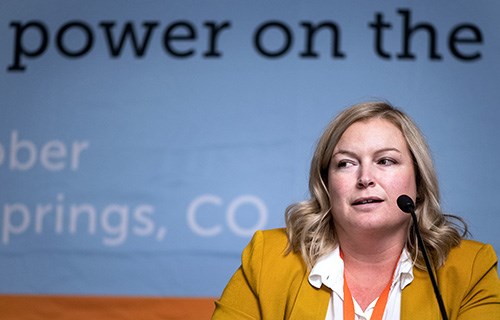Athletes must be heard
In a panel on players’ voices, chaired by Lisa Kihl, past President of the North American Society for Sports Management, the main question was how athletes should be represented: by themselves or the governing bodies?
According to the panel, the consensus was clearly the latter despite the difficulties player unions still face in gaining acceptance.
“It’s still a struggle to be engaged at the decision-making table. We have to fight our way in. Sometimes we have to crash the tables,” said Ashley Labrie, Executive Director of Canadian body AthletesCAN.
There was no one obvious model for player representation, but independence is crucial suggested Beckie Scott, chair of the Athlete Commission at World Anti-Doping Agency (WADA), who said: “The most effective athletes representatives have an interest in anti-doping and integrity but they are also independent.”
The formation of athletes’ unions is growing according to the World Players Association (WPA) but obstacles remain.
Matthew Graham, the WPA’s co-ordinator of legal & player affairs, said: “We need to communicate to athletes that they can form these bodies. These committees are not a substitute for independent representation by players.”
“The tide is changing and we are seeing more and more player associations being formed, but structural barriers still exist like legal barriers under national laws.”, Graham cited the inability of US college athletes to organise as they were not employees.
The classification of an athlete in terms of union membership is particularly difficult giventhe scandals over abuse of young athletes, suggested Han Xiao, Chair of the Athletes’ Advisory Council in the USA.
He explained: “For the most part, we identify with competing athletes but the definition of what is an athlete is something we are constantly working on. When we talk about athletes’ rights and human rights we are referring to a much broader base.”
A former international table tennis player for the USA, Han Xiao also raised the issue of finding a consensus amongst athletes.
“People expect us to represent everyone all of the time and bring consensus to the table, but in my sport it’s nearly impossible to get five athletes to agree on anything,” said Han. “It’s next to impossible to bring consensus to the table.”
Despite these difficulties, player unions must be run by players and the suggestion that athletes are not competent is false, added Ashley Labrie.
She explained: “We believe the idea that athletes don’t have the competence to serve on a body is false. There are plenty of athletes that have the competency outside of sport that makes them better than some of the people serving the sport.”
Matthew Graham agreed, saying that player unions needed to be driven, organised and funded by athletes. He said: “Players will let you know if they are not happy. On the more extreme end, they can take back control of the union. That’s how we know we are effective as players are not shy of letting us know.”
Amidst the parties vying for control of international sport, the panel agreed that the voice of the player must always be heard, and athletes will continue the fight to make sure this happens.
In more than 40 sessions, over 170 speakers will present their thoughts and oponions on a wide range of the most topical questions in world sport during the 11th Play the Game conference, taking place in Colorado Springs, USA, 13-16 October 2019.







